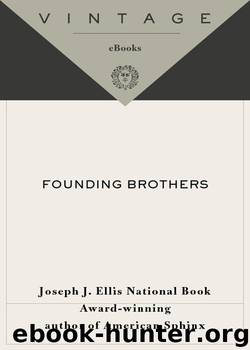Founding Brothers by Joseph J. Ellis

Author:Joseph J. Ellis
Language: eng
Format: mobi
ISBN: 9781400077687
Publisher: Knopf Doubleday Publishing Group
Published: 2003-10-30T10:00:00+00:00
THE MANNER in which the Farewell Address was actually composed, as it turned out, served as a nearly perfect illustration of its central message—the need to subordinate narrow interests to the larger cause. Much ink has been spilled by several generations of scholars in an effort to determine who wrote the bulk of the words that eventually found their way into print and then into the history books. Like a false scent, the authorship question has propelled historians down labyrinthine trails of evidence in quest of the real and true author. Meanwhile, the object of the hunt sits squarely in the middle of the evidentiary trail, so obvious that it is ignored. Namely, the creation of the Farewell Address was an inherently collaborative process. Some of the words were Madison’s; most of the words were Hamilton’s; all the ideas were Washington’s. The drafting and editing of the Farewell Address in effect became a metaphor for the kind of collective effort Washington was urging on the American people as a whole.48
The story had its start four years earlier, in May of 1792, when Washington approached Madison to help him compose a valedictory address. At the time fully convinced that he would step down after one term, Washington had chosen Madison because his two most trusted cabinet members, Hamilton and Jefferson, were too closely associated with the party disputes he wanted to condemn. Madison made extensive notes on the basis of three conversations with Washington, then drafted a document that employed the president’s own language for many key passages: “a spirit of party in the Government was becoming a fresh source of difficulty”; “we are all Children of the same Country”; the nation’s “essential interests are the same … its diversities arising from climate and from soil will naturally form a mutual relation of parts” and serve as the formulation for “an affectionate and permanent Union.” It was Madison who first proposed that the Farewell Address not be delivered as a speech to Congress, but that it be printed in the newspapers as “a direct address to the people who are your only constituents.” After Washington listened to the unanimous advice of all his cabinet officers and reluctantly agreed to serve a second term, he tucked away Madison’s draft for another day.49
That day arrived exactly four years later. On May 15, 1796, Washington sent Hamilton the “first draft” of a retirement address—no amount of persuasion could change his mind this time—that would announce his departure from public life. The first section of this document reproduced Madison’s draft of 1792, which was highly ironic, because Madison had become the primary leader of the Republican opposition to Washington’s policies in the Congress and was therefore a rather dramatic example of the party spirit that his former words had warned against. (The Federalists referred to Madison as “the general” of the opposition, calling Jefferson, his mentor secluded at Monticello, “the generalissimo.”) Washington included the earlier Madison draft for two reasons: First, it expressed in clear
Download
This site does not store any files on its server. We only index and link to content provided by other sites. Please contact the content providers to delete copyright contents if any and email us, we'll remove relevant links or contents immediately.
| American Revolution | Civil War |
| US Presidents |
Fanny Burney by Claire Harman(26601)
Empire of the Sikhs by Patwant Singh(23084)
Out of India by Michael Foss(16853)
Leonardo da Vinci by Walter Isaacson(13336)
Small Great Things by Jodi Picoult(7137)
The Six Wives Of Henry VIII (WOMEN IN HISTORY) by Fraser Antonia(5514)
The Wind in My Hair by Masih Alinejad(5095)
A Higher Loyalty: Truth, Lies, and Leadership by James Comey(4959)
The Crown by Robert Lacey(4814)
The Lonely City by Olivia Laing(4801)
Millionaire: The Philanderer, Gambler, and Duelist Who Invented Modern Finance by Janet Gleeson(4478)
The Iron Duke by The Iron Duke(4354)
Papillon (English) by Henri Charrière(4273)
Sticky Fingers by Joe Hagan(4197)
Joan of Arc by Mary Gordon(4109)
Alive: The Story of the Andes Survivors by Piers Paul Read(4031)
Stalin by Stephen Kotkin(3965)
Aleister Crowley: The Biography by Tobias Churton(3640)
Ants Among Elephants by Sujatha Gidla(3467)
